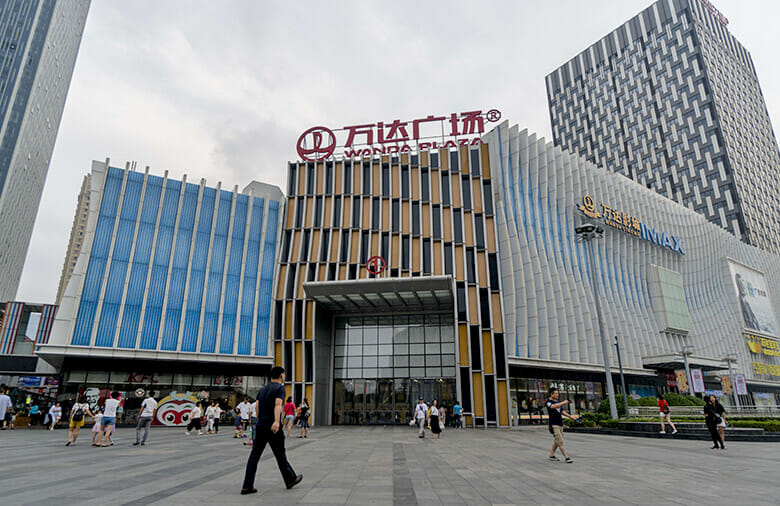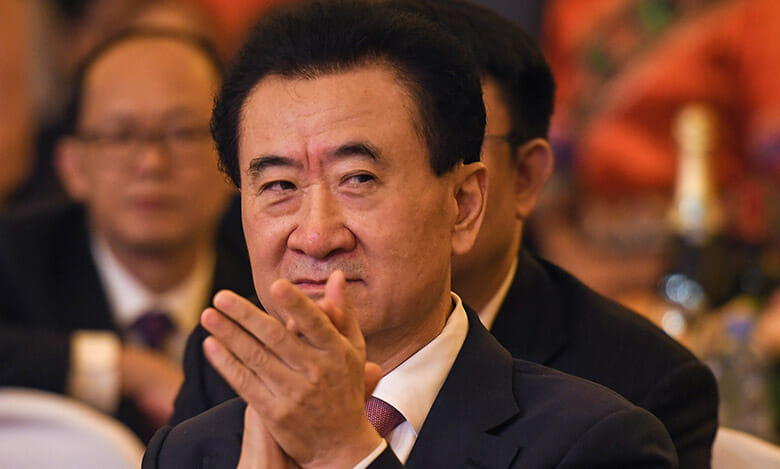
This Wanda Plaza in Shandong Plaza will have to wait a bit later to join the Hong Kong bourse (Getty Images)
The shopping centre unit of Chinese conglomerate Dalian Wanda Group last week submitted a third prospectus for a Hong Kong initial public offering after two earlier applications had expired without seeing China’s largest commercial developer rejoin a stock exchange it left in 2016.
One year has passed since Zhuhai Wanda Commercial Management Group (Wanda Commercial) originally applied for what analysts predicted at the time could be a $3 billion IPO. The company’s second prospectus, submitted in April, lapsed on 24 October, according to information posted to the Hong Kong stock exchange.
Wanda Commercial had reportedly passed a hearing by Hong Kong stock exchange, but the company decided to hold off due to the continued downturn of Hong Kong-listed stocks, said China Business News, citing an analyst.
Positioned as management company which develops and operates shopping centres on behalf of investors and local governments, Zhuhai Wanda is facing a tough IPO climate, with an index of property developers on the Hong Kong exchange down more than 33 percent so far this year. Fundraising via new listings on the Hong Kong bourse fell by 91 percent in the first half of 2022, before showing some signs of recovery in the third quarter.
Listing Deadline
Wanda Commercial’s latest prospectus shows that the property arm of billionaire Wang Jianlin’s Beijing-based Wanda Group recorded revenues of RMB 13.5 billion ($1.9 billion) in the first half, up 26.7 percent from the same period of last year. Net cash flow from business operations was 2.7 billion yuan, up 109.3 percent year-on-year.

Wang Jianlin is hoping to having something to cheer for soon (Getty Images)
A company can renew their IPO application within three months of an expiration without having to start over, according to the listing rules of the Hong Kong bourse, however, the clock is ticking for Wanda Commercial to fulfill its promise of an IPO by the end of 2023
Passing that listing deadline would obligate Wanda to buy back shares from its pre-IPO investors, which are said to include Hong Kong private equity shop PAG, developer Country Garden, investment firm CITIC Capital, and tech giants Tencent and Ant.
CITIC Securities, JP Morgan, and Credit Suisse are joint sponsors for the listing.
Negative Outlook
Citing uncertainty over Wanda Commercial’s listing, S&P in August revised its outlook for the parent company, Dalian Wanda Commercial Management Group, to negative.
“We treat the pre-IPO funds of RMB 39.5 billion as debt. The result of the listing application, listing time, and market value remain uncertain. If Wanda Commercial is not listed by end-2023 and all pre-IPO investors choose to exercise their put option to withdraw their investments, Dalian Wanda Commercial Management Group’s and Dalian Wanda Group’s liquidity and financial metrics will likely deteriorate,” said the credit rating agency.
Wanda Commercial has also guaranteed its investors that it will generate net profits of at least RMB 5.19 billion, RMB 7.43 billion and RMB 9.46 billion in 2021, 2022, and 2023 respectively. Should Wang Jianlin’s company fail to meet those targets, the company would need to compensate investors with cash or shares in Wanda Commercial.
Wanda Group created Wanda Commercial in March 2021 by spinning off a set of properties under its management with a RMB 3 billion strategic investment from the Zhuhai government.
While marketed as an ‘asset light’ company, of the 425 Wanda Plaza malls in mainland China operated by Wanda Commercial as of the end of June, 285 were owned by the parent group and another 140 were managed on behalf of independent third parties.
That portfolio measured 60.1 million square metres (647 million square feet) with another 196 projects in the pipeline.
The company said the average occupancy rate of Wanda Plaza malls under its management as of June was 98.6 percent.
Lower Leverage
Wanda Commercial’s debt pressure eased in the first half, as its debt to asset ratio fell to 68.1 percent in June from 70.9 percent last December and 80.4 percent last June, according to the firm’s new prospectus. As of the end of June, Wanda Commercial had cash and cash equivalents of RMB 15.8 billion.
Should Wanda achieve its IPO goal, it will mark the return of the company’s mall business to the Hong Kong exchange after an ill-fated $4.4 billion exit in 2016 as Wang and a group of backers aimed for a more lucrative listing on a mainland Chinese exchange.
Wanda formally withdrew its application for a listing on China’s A-share market last year, vowing at the time to pursue other opportunities for an IPO.
Leave a Reply